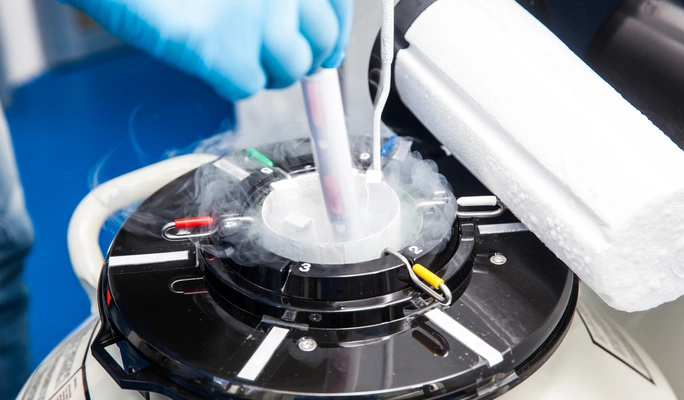Egg freezing
Preserve your fertility and choose the best moment to become a mother

Egg freezing is a technique that allows women to postpone motherhood. On this page, we explain the process step by step — from ovarian stimulation to the vitrification procedure in the laboratory.
We also outline who this technique is recommended for — women who wish to delay motherhood for personal, professional, or medical reasons. At Fertility Madrid, we follow a transparent pricing policy, so you will know from the very beginning the full costs of the procedure as well as the available financing options.
Discover how oocyte vitrification can help you plan your reproductive future with confidence and peace of mind.
Why choose egg freezing?
Egg freezing offers multiple benefits and valid reasons to consider this option. Many women choose to preserve their fertility to increase their chances of having a healthy baby in the future—particularly those facing certain illnesses or medical treatments.
This technique is also ideal for women who wish to postpone motherhood until it is more convenient, whether due to educational or professional goals, or waiting to find the right partner. In addition, egg freezing allows women who want to prioritize their careers to still have the option of becoming mothers later, avoiding the impact of the natural decline in fertility with age.
Situations where egg freezing is recommended:
- Age: If you are waiting to have children, egg preservation can be a wise choice to protect your fertility before it declines. Many women opt for this technique because of educational or professional goals, or simply because they are not yet ready for motherhood and prefer to have children later in life.
- Cancer: Treatments such as chemotherapy, radiotherapy, and cancer surgery can affect fertility. Freezing eggs before starting treatment is an important option to safeguard reproductive capacity.
- Autoimmune diseases: Conditions such as lupus and rheumatoid arthritis, along with their treatments, can affect fertility, making egg preservation an essential consideration.
- Reproductive health conditions: Issues like endometriosis or uterine fibroids can make pregnancy more difficult, so egg freezing may provide a solution to preserve fertility.
- Gender transition: People undergoing gender reassignment treatments may experience changes in reproductive capacity. Preserving embryos, eggs, or sperm before treatment is an option to maintain the possibility of having children in the future.
In short, egg freezing is a powerful tool to plan and protect your reproductive future, offering peace of mind and control over decisions about motherhood at different stages of life and under various medical or personal circumstances.
Egg freezing
The main reason for this decline is the quality and quantity of the eggs. At the age of 30, it may take around 6 eggs to obtain one viable embryo, while at 43, this number can rise to as many as 18. In fertility preservation treatment, ovulation is stimulated to collect as many mature oocytes as possible.
As a woman ages, her ovaries produce fewer eggs, and the quality decreases. This significantly reduces the chances of achieving pregnancy both naturally
Egg freezing makes it possible to preserve the quality of eggs at the age they were vitrified. For example, if a woman freezes her eggs at 30, she could use them even a decade later without worrying about quality loss, maintaining pregnancy chances similar to when she was 30.
If you want to become a mother but have not yet decided when, egg freezing offers a reliable backup plan that allows you to plan your maternity in the future without risk. Ideally, fertility should be preserved before the age of 35.
Who is egg freezing for?
Women who postpone motherhood for different reasons, or because economic or work circumstances require it.
- Patients who, for ethical reasons, do not wish to vitrify embryos
- Women with low ovarian response who want to accumulate oocytes over several cycles
- Patients at risk of losing ovarian function due to medical treatments, illness, or endometriosis
- Patients preparing for gender reassignment treatment
How are eggs frozen?
The eggs remain stored until the patient decides the time is right to become a mother.
Preparatory phase
In this initial stage, patients receive a detailed explanation of the process, specialized counseling, and comprehensive medical evaluations. Routine gynecological examinations and blood tests are performed to ensure the patient’s health and safety.
Hormonal stimulation
Ovarian stimulation in fertility preservation involves the use of hormonal medication to stimulate the maturation of multiple antral follicles.
Naturally, women develop and mature only one egg per cycle. However, with hormonal treatment, the goal is to promote the growth of several antral follicles in order to increase the number of mature eggs available for preservation.
During stimulation, regular medical check-ups are carried out with ultrasounds and blood tests to carefully monitor the progress of the treatment.
Follicular puncture (egg retrieval)
Follicular puncture, a crucial stage in the fertility preservation process, is performed approximately two weeks after starting hormonal medication.
This procedure is carried out in the operating room under mild anesthesia (sedation) and involves aspirating the antral follicles to obtain the oocytes in a precise and controlled manner.
Egg freezing (vitrification)
The retrieved oocytes undergo treatment and preparation for cryopreservation. This procedure involves the use of cryoprotectants before freezing through vitrification, ensuring that they are preserved under optimal conditions until they are needed in the future.
Oocyte cryopreservation keeps the eggs at a temperature of –196°C, where cellular metabolism comes to a complete halt, guaranteeing their preservation for an indefinite period of time.
Egg vitrification
55 € / month
Finance your fertility preservation treatment!
- Free first consultation
- Gynecological check-up
- Hormonal blood test
- Ultrasound monitoring
- Egg retrieval (puncture)
- Oocyte vitrification (5 years of storage included)
Frequently asked questions
What are the success rates of egg freezing?
Success can vary significantly depending on your age and the number of eggs frozen. To give you an accurate estimate of success, we need to assess your ovarian reserve and egg quality. This requires a consultation and gynecological check-up.
When is the best time to talk to your doctor about egg freezing?
Ideally, before the age of 35. However, even if you are older, it is still important to consult and explore your options.
How long can eggs remain frozen?
Egg cryopreservation keeps eggs at –196°C, stopping cellular metabolism and ensuring indefinite preservation.
What are the risks of egg freezing?
According to studies, the risks are minimal.
Is egg freezing worth the investment?
Egg freezing can be considered a reproductive insurance policy for women who wish to postpone motherhood. It offers the opportunity to preserve fertility at a time when egg quality is higher. It is worth considering if you plan to delay pregnancy for personal or professional reasons and want to maximize your chances of having children later in life.
Does egg freezing affect my ovarian reserve?
No, it does not. The eggs collected are those that would have been naturally released that month.
How much does egg freezing cost at Fertility Madrid?
At Fertility Madrid, we offer a transparent pricing policy and tailored financing options. Fertility preservation treatment includes the first consultation free of charge, ultrasound monitoring, hormonal blood tests, egg retrieval, and vitrification with 5 years of storage. We also offer installment plans starting from €55/month, so cost does not stand in the way of planning your future motherhood.
What happens if I never use my frozen eggs?
You can choose to discard them, donate them to scientific research, or donate them to help other women who face difficulties conceiving.
Does egg freezing guarantee a future pregnancy?
No, egg freezing does not guarantee pregnancy, but it significantly increases the chances of success compared with using older eggs. The likelihood of pregnancy depends mainly on the woman’s age at the time of vitrification and the quality of the frozen oocytes. For example, freezing eggs before the age of 35 preserves a stronger ovarian reserve and increases the chances of achieving pregnancy later.
Is egg freezing painful?
The process is not painful, although it may cause mild and temporary discomfort. Ovarian stimulation with hormonal medication lasts about 10–12 days and can cause bloating similar to ovulation. The egg retrieval procedure is done under mild sedation, so the patient feels no pain and can return to normal activities within 24–48 hours.
